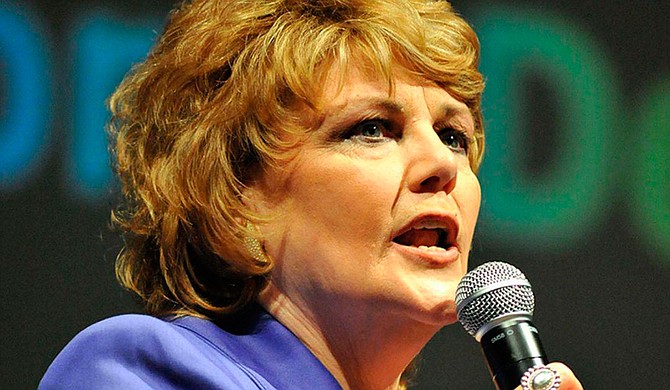Madison Mayor Mary Hawkins Butler opposed Initiative 65 because it limits cities’ ability to regulate the location of medical marijuana businesses. The Republican mayor sued the state days before the election, arguing that the initiative was not properly on the ballot because of the number of signatures gathered. Photo courtesy MHB4 Auditor
JACKSON, Miss. (AP) — A court fight threatens to block a Mississippi medical marijuana program before the program even gets started.
Voters on Nov. 3 approved a medical marijuana initiative by a wide margin — about 58%, according to certified results. The initiative amends the state constitution, requiring the Health Department to set regulations and begin the program by mid-2021.
Madison Mayor Mary Hawkins Butler opposed Initiative 65 because it limits cities’ ability to regulate the location of medical marijuana businesses. The Republican mayor sued the state days before the election, arguing that the initiative was not properly on the ballot because of the number of signatures gathered.
The Mississippi Supreme Court told attorneys for both sides of the lawsuit to submit written arguments.
In a Dec. 8 filing, Butler's attorneys asked justices to declare that Initiative 65 is invalid, even though it has been approved by voters. The attorneys argued that if justices do that, legislators could still “heed the will of the majority” and enact a state law to create a medical marijuana program.
State attorneys defending the medical marijuana initiative have a Dec. 28 deadline to file arguments in response.
Here's the central issue: Section 273 of the Mississippi Constitution creates the initiative process, and it says initiative sponsors have one year to gather signatures from registered voters. It specifies that no more than one-fifth of the signatures may come from any congressional district. Mississippi had five congressional districts when that process was written in the early 1990s. The state dropped to four districts after the 2000 Census, but the language in the constitution remained.
Butler argues that the constitution creates a mathematical impossibility: With four districts, more than one-fifth of the signatures must come from each.
The state attorney general’s office issued a legal opinion in 2009 saying that initiative sponsors should collect signatures from the five districts used in the 1990s. In September 2019, then-Secretary of State Delbert Hosemann said the medical marijuana initiative qualified for the ballot because petition sponsors had enough signatures from each of the five old districts.
In their Dec. 8 filing, Butler's attorneys made an argument about the separation of executive and legislative powers in state government. They said legislators have known for years about the problem in the initiative process but have killed multiple proposals to fix it. The attorneys said the secretary of state should not have relied on an attorney general's opinion about signatures coming from the five outdated congressional districts — that's one executive-branch agency listening to another, when decisions should be made by the legislative branch.
“It simply is not the role of the Secretary of State or the Attorney General to amend the Constitution when the Legislature fails to act," Butler's attorneys wrote.
In 2011, Mississippi voters approved two other initiatives that landed on the ballot under the attorney general's guidance. Sponsors gathered signatures from the five old congressional districts after the state had only four districts.
Initiative 27 requires voters to show government-issued photo identification at the polls. Initiative 31 restricts governments from using the eminent domain process to take land for private developments.
Supporters of medical marijuana say Butler waited too long to challenge Initiative 65. Butler's attorneys say their complaint was filed on time, but they also say the legal principle that requires a timely challenge could protect voter ID and eminent domain if the Supreme Court invalidates the medical marijuana initiative.
“For Voter ID, the State has spent significant resources implementing its requirements, and countless elections have taken place since its enactment,” Butler's attorneys wrote. "For Eminent Domain, the State has structured its takings over the last nine years to comply. ... The existence of these two other voter-initiative amendments is no bar to the Court’s review of this challenge to the sufficiency of the Initiative Measure No. 65 petition.”
Copyright Associated Press. All rights reserved. This material may not be published, broadcast, rewritten, or redistributed.



Comments
Use the comment form below to begin a discussion about this content.
comments powered by Disqus